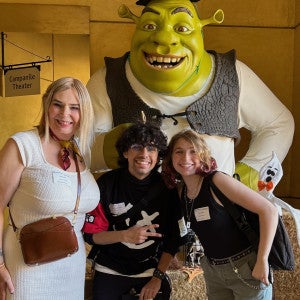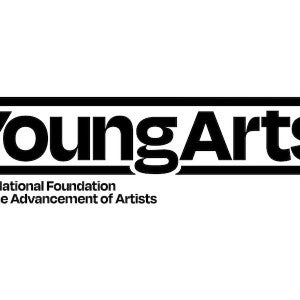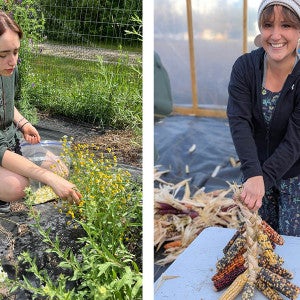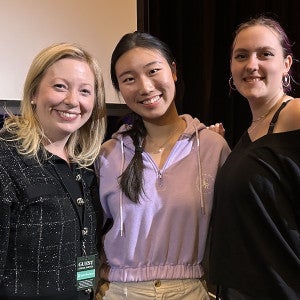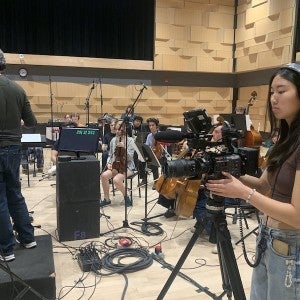Arts Academy trumpet alumnus discovers a passion for filmmaking
Mike Gioulakis (IAC 96-98, IAA 00-01) reflects on how his musical education at Interlochen Arts Academy prepared him to pursue a career in film.

Mike Giolakis (far right) played trumpet in the Interlochen Arts Academy Band from 2000-2001.
Growing up in Plantation, Florida, just outside of Ft. Lauderdale, Mike Gioulakis was immersed in the arts from day one. Thanks to his parents’ background—his father graduated from Berklee College of Music and his mother studied voice at Boston University—music “was always present” in his home, he says. Gioulakis began playing the trumpet in sixth grade. After that, he spent his summers at Interlochen Arts Camp and his senior year of high school studying the instrument at Interlochen Arts Academy.
But it wasn’t just music that permeated his childhood. Gioulakis’s father was also very interested in film, and the two of them watched everything from arthouse classics to experimental motion pictures. For young Gioulakis, this hobby eventually turned into a career. He enrolled at Florida State University (FSU) and chose to major in fine arts with a focus on photography. During his time at FSU, he enjoyed making films with his peers.
In 2007, after a few years shooting and working in lighting tech in New York, Gioulakis moved to Los Angeles, where he was soon tapped to serve as the cinematographer for Don Coscarelli’s film John Dies at the End. The film premiered at the 2012 Sundance Film Festival. Gioulakis has since worked extensively with M. Night Shyamalan, as well as with famed directors Mike Ott, David Robert Mitchell, Jordan Peele, and Michael Showalter.
Gioulakis credits his multifaceted education—including exposure to music, photography, and filmmaking, as well as the liberal arts he studied at FSU—with his interdisciplinary approach to cinematography.
Here, he talks about his shift from studying music to filmmaking, what inspires his work, and his advice for the next generation of cinematographers.
You started off studying music but eventually moved into photography and filmmaking. What led to the change in career path?
I came from a musical household. My parents were musicians in college. I did my senior year at Interlochen Academy for trumpet, thinking that I was going to continue down that path. But film was a second interest. My father was really into film, and so I watched a lot of films in high school and started getting into some interesting directors and paying attention to cinema—but not really thinking about it as a career, because I was focused on the music track.
At Interlochen they had Friday night open mic events at a coffee house. It was music, but it was also poetry readings and other stuff. A friend of mine played a film that he made—a little short, stop-animation thing. I saw that, and I connected with him, realizing, “I think I want to change paths.”
How did your study of music influence your perspective as a filmmaker?
I benefited a lot from having that musical background. The focus to hone and perfect and work on the craft—and the discipline it takes to do that—transferred over. In cinematography, you need to have a good understanding of the technical side of things to be able to create images and art and express it in the way that you want to express it. I think that's very similar to music, where you can’t just pick up an instrument and start being able to play it. You need years and years of practicing, and you need to master the technique of the instrument—and then you will be able to express it creatively, artistically. At the end of the day, the technique and the craft are a means to an end.
What draws you to the filmmaking projects you tackle?
More than anything, I like working on projects that are director-driven, projects with a singular voice. The films that I always like are the ones in which you can hear the voice of one person. The faults [of that individual] are what makes that particular storyteller unique. The director acts as a filter—he’s the singular filter. There are not 20 different filters.
How did you first break into the film industry?
After Interlochen I went to Florida State University. I didn’t get into film school there, but I studied art. I did photography. But I spent most of my time at the film school, just working on as many student films that I could. All of my friends were filmmakers.
When we moved to L.A., I started working on the lighting crew side. I got into the lighting union and worked as an electrician, a set lighting technician, and a gaffer. I would shoot when I could on the side, mostly with some of the alumni from Florida State and folks that I knew from there. The crewing gave me some financial stability while I was between cinematography projects.
I shot some small films and then ended up shooting It Follows [2014], which was a horror movie, in 2013. That did well. And it gave me a step up, put me on the map. [M.] Night [Shyamalan] saw that film and called me. I ended up getting the job for Split [2016] and then worked with him for two movies and a TV show.
Is there an especially formative experience at Interlochen that stands out?
Probably the most formative experience I had was seeing a short [film] that was made by a student there who was a really close friend of mine, David Fetzer. He was just an amazing, super-talented actor and director. I saw that short he made and I came up to him and said, “Hey, want to make stuff together?” So we made films together while we were at Interlochen. [Fetzer passed away in 2012.]
How did your Interlochen experience influence your artistic development and career?
I came from a suburb of Florida, which is wonderful, but not a hotbed of arts and culture. So all of the sudden my whole school was filled with these other likeminded kids. I remember watching movies—[Pier Paolo] Pasolini films and Peter Greenaway films and [Michael] Haneke films—with a bunch of people who were into the same thing as I was. You just didn't find that in a suburb of Florida. It was a world-opening, eye-opening experience to realize, “Oh, the world is bigger than what I’ve known in the past.” And that was inspiring and made me push more.
What’s your biggest piece of advice for aspiring young filmmakers?
In the film industry, find a group of people that you like to make films with and then just keep making them in any way that you can, in the hope that eventually something will click. Don’t do it for any other reason than because that’s what you love doing.
The hardest part is getting that first step. Don’t give up, and don’t worry about who's doing what or whose success is what. Just stick with it. It takes time in this industry.
Also, be nice and kind to people. It’s that simple lesson you learned in kindergarten—but you know what? It’s true. It helps.
